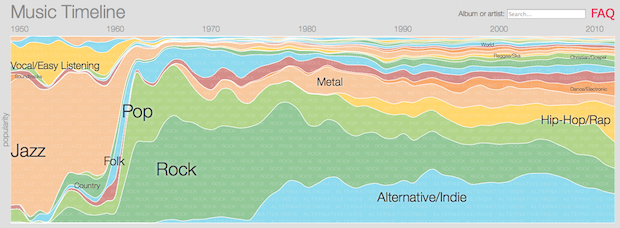
So here you have it. The history of popular music complete precise and probably flawed. It gives a pretty convincing overall picture, clearly showing the massive revolution of the 1960s in which jazz almost died as Pop and Rock burst onto the scene.
But where is the data from? Well, from the likes of you and me or, to be more accurate, music enthusiasts who are using Google Music (and that makes it a pretty small subset at the moment).
In a very Google way, the labs collect data about what music people have in their libraries under which genre and link it back to the year of issue. Shazam – a picture of, well, I’m not sure really. It just shows what music people own now, in digital form. It doesn’t pretend to illustrate current popularity in terms of how many people are actually listening to it, and that’s as well, it’s about the history of popular music.
Artists are categorised by genre, each of which is clickable in the timeline to reveal sub-genres. Go into the sub-genres and you can drill right down to specific artists and albums, some of which seem to be somewhat eccentrically categorised. Check out which artists are categorised as “rock”. There’s artist information and, of course, you can go off and play the artists music.
It’s an interesting and compelling experiment which you can explore for yourself:
http://research.google.com/bigpicture/music/#
Just don’t base your PHD thesis on the results!
Leave a Reply
You must be logged in to post a comment.